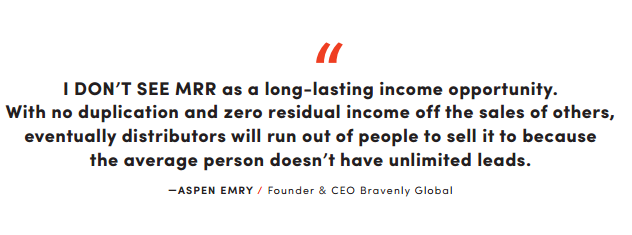Distributors and affiliates are exploring the Master Reselling Rights opportunity—but this emerging trend comes with enormous risks for the sellers and the companies they represent.
Direct selling is changing. The channel continues to grow, evolve and expand to include new models under the umbrella term of direct selling. Some of these innovations—like affiliate programs—offer real opportunity and welcome new participants into the channel.
But not every opportunity stands up to scrutiny. At a recent industry event, executives from over 30 direct selling companies shared their concerns regarding Master Resell Rights (MRR). MRR is a type of licensing agreement in the digital product industry. It grants the licensee the right to sell a digital product and they in turn can resell that right to others.

MRR often takes the form of online training courses focused on building lucrative online brands and businesses—an enticing pitch to aspiring entrepreneurs and influencers. And while the selling points for purchasing these courses (typically in the $500 range) are intriguing, this “opportunity” could easily be characterized as nothing more than a digital chain letter.
At first glance, it sounds like a great fit for affiliates to grow their reach and reputation by marketing an online course that teaches others how to replicate their success. But it’s far more complicated than it appears and comes with its own substantial set of concerns that’s currently creating chaos and confusion in the channel.
Because of its disruptive nature and the potential problems it presents for distributors and—in a broader sense—the channel itself, Direct Selling News reached out to attorneys that represent and advise direct selling companies as well as channel executives to better understand what MRR is; what it isn’t; and exactly what kind of havoc it can create.
Ethical Concerns
MRR is a licensing arrangement in which the holder of MRR can resell a product and often pass on the resell rights to the buyer. These products can include ebooks, software, training courses, templates and various digital goods. Although this is a relatively new opportunity being marketed to distributors, attorneys specializing in direct selling have already expressed concerns about MRR.

Brent Kugler, a Partner at Scheef & Stone whose practice focuses on representing direct selling, MLM and network marketing companies in lawsuits, arbitrations and regulatory matters, shared his thoughts on the potential pitfalls.
In his opinion, an MRR program, depending on the purchase price and how it is marketed, may violate the Federal Trade Commission’s (FTC) business opportunity rule or state business opportunity statutes. “This creates potential significant liability for the seller unless the seller adheres to the extensive and burdensome disclosure requirements,” Kugler explained. “And because MRR is essentially a one-time sale of a training module, there is no residual income element. In many MRR programs, recruitment of others doesn’t provide any opportunity for additional income.”
A more practical concern Kugler expressed was financial in nature. “Due to the cost and non-refundable nature of MRR programs, it can be anticipated that a great number of purchasers will not recoup their purchase price.” Kugler also noted that intellectual property issues related to content exist. “Most of the MRR sale terms and conditions I have reviewed do not contain language that sufficiently protects the purchaser from third-party intellectual property infringement claims.”
Katrina Eash, Partner at Winston & Strawn who concentrates her practice in complex commercial, class action and intellectual property litigation, shared her thoughts. “Distributors must understand the terms of the license they receive as those terms greatly impact how the product can be used, distributed and/or modified,” she explained. “Distributors need to understand whether, and to what extent, they’re required to credit the creator of the product. And distributors should watch out for—and avoid—creation of derivative works (if not permitted) and potential trademark/copyright infringement. These are just a few of the more prevalent intellectual property concerns surrounding master resell and private label rights. A misstep with any of them could result in costly legal ramifications.”
Considering recent wins direct selling has had against the FTC, any activity that draws the scrutiny of the agency or presents regulatory challenges can only harm the channel and the people that rely on it for their livelihoods.
False Claims, False Expectations
Another important thing for participants to understand is that the distributors who would have an audience for these kinds of training products already have a sizeable following. So, while field leaders with thousands of people in their team might pressure their downline to purchase the courses, it is difficult if not impossible for a smaller distributor to replicate that success or make any money at all. There is no one for them to sell it to that the bigger distributor hasn’t already solicited. And the longer it goes on, the less opportunity exists.
It’s easy to see why industry executives are concerned and advising their field to avoid the temptation of MRR. Amber Olson Rourke, Chief Marketing Officer at Neora said, “Selling a video course for close to $500 when you could find very similar content on YouTube for free is a risk. Is it possible to get some ‘quick income’ from this? Sure. But is the risk to your reputation and the distraction, confusion and disruption this will cause to your main business worth it?”
Aspen Emry, Founder and CEO of Bravenly Global shares Olson’s concerns. “it’s a HUGE distraction. MRR is appealing because it seems quick and easy, and distributors don’t have to do the training and teaching components of building a team. What concerns me is that the pitch often bashes direct selling by saying things like ‘If you’re tired of MLM’ or ‘Want to make quick money without MLM?’. It’s deceptive and preys on people who just need time to learn the direct selling business and build something sustainable. The kind of fast money that’s being promised is not achievable for most people.”
Taking a Stand
Many executives, concerned about the impact MRR could have on their hard-working distributors, are taking proactive measures, including amending their policies and procedures to limit the damage MRR can do. As one executive explained, “We’re adding more restrictions because we feel like it is damaging the field and preying upon them as well. It creates a massive breeding ground for cross recruiting. These courses and email chains are a real threat to distributors.”
Melissa Thompson, Founder and CEO of BELLAME, explained her company’s approach. “We allow our Partners to represent multiple brands without restriction,” she said. “Nonetheless, we’ve established guidelines to maintain our community’s integrity. Challenges for our field have been centered around unethical behaviors of those marketing the MRR—not necessarily the MRR business itself. Many Brand Partners have reported unwarranted solicitation where their upline is harassing them to invest in an opportunity to get rewarded with big money for little to no work. Our current policies and procedures have been sufficient in addressing these issues.”

For companies looking for guidance in their own policies and procedures surrounding MRR, Kugler offered the following. “A lot of companies have policies in place prohibiting the sale of non-company training/marketing materials. A well-drafted non-solicitation policy that includes MRR within the definition of other ‘direct sales business opportunities’ can also be effective.”
Danger Ahead
Affiliate marketing and MRR are distinct business models. The simplest explanation is that in affiliate marketing you act as a promoter and earn commissions, but you don’t own the products. It’s a longer-term, more sustainable opportunity. While some affiliate marketers may be intrigued by the concept of adding MRR to their businesses, there are many valid reasons to avoid them.
More Resources
Affiliates are focused on promoting for a reason—they have a loyal audience, charisma and are natural born salespeople. They are sharing products and services they know, love and trust. MRR products require more involvement in product ownership, quality control and customer support, taking time away from the critical, income-earning tasks related to promotion and sales.
More Oversight
MRR products come with reselling rights—but they also come with responsibilities. With direct selling, affiliates never have to assume responsibility for product development or quality—it’s all done for them. With MRR, they must assume that responsibility.
Lower Quality
The quality of MRR products varies widely. Some may be valuable, but many are poorly made or outdated. Customer trust is key for affiliate success. Affiliates need to promote products of consistent quality to maintain credibility and trust.
Intense Competition
Identical MRR courses can be sold by multiple people within the same community, which can quickly lead to overlap; mixed messaging; and market saturation. It can be very difficult to stand out in a crowd when these rights are sold repeatedly.

Additional Time and Tasks
MRR products may require affiliate marketers to provide customer support. Managing inquiries, issues and refunds can be time consuming, distracting and impact the bottom line.
Brand Consistency
Direct selling companies often have specific branding, marketing and product strategies affiliates and distributors are expected to follow. Introducing MRR products with different branding and lower quality standards can quickly dilute brand identity or imply endorsement.
Ethical Concerns
Direct selling companies often have a strong focus on ethical business practices and long-term customer relationships. Some MRR practices, especially those associated with low-quality or unethical products, can contradict these principles and damage reputations.
Customer Disappointment
When MRR products fail to meet consumer expectations, it can result in dissatisfaction and negative reviews, potentially harming the reputation of the affiliate/distributor and the direct selling company.
Lasting Opportunity or Passing Fad?
MRR is not the first (or last) “easy money” opportunity to distract, discourage and ultimately disappoint distributors. Many other schemes with unsubstantiated promises of big money with little effort have made an initial splash then quickly crashed and burned.
And although it hurts the companies, it hurts distributors even more—especially those just starting to build their businesses. It diminishes belief; damages reputations; depletes resources; and distracts from the legitimate, long-term opportunity direct selling represents.
As Emry shared, “I don’t see MRR as a long-lasting income opportunity. With no duplication and zero residual income off the sales of others, eventually distributors will run out of people to sell it to because the average person doesn’t have unlimited leads.”
That sentiment is echoed by Kugler. “MRRs are bright shiny objects for distributors to be attracted to (and distracted by) only because they feel they can generate income from the sale to their downline participants. This is a fad, and it will pass. But—in the meantime—companies can adopt policies to prohibit the promotion of MRR within the sales network or enforce existing policies that prohibit the sale of marketing programs to other participants.”

Ultimately, these measures protect both the field and the companies they represent. While MRR sounds like a great opportunity to build an affiliate’s sphere of influence and make money quickly, any success found from selling MRR is likely short-lived and disruptive to the community and the channel.
In many ways it flies in the face of the time-honored strategies and philosophies that lead to long-term direct selling success. As Olson Rourke summarized, “Those chasing instant gratification are robbing themselves of the sustainable success that comes from disciplined daily action.”
Key Distinctions
It’s important to understand the structural and philosophical differences between affiliate marketing and MRR. We’ve highlighted three components of both.
Affiliate Marketing
- Commission Based
Affiliates earn commissions by promoting and selling products or services owned by other companies. Their role is to drive traffic, generate leads and facilitate sales. They are often given additional perks for sales goals and provided ongoing support from the companies to achieve those sales goals. - Promotion and Marketing Focus
This model allows affiliates to capitalize on their existing strengths and assets to focus on promotion and marketing. By leveraging their existing blogs and social media presence, affiliates attract customers to the brands they have chosen to partner with—brands that clearly align with their existing values and interests. - No Ownership or Oversight
Time-, labor- and resource-draining components of doing business such as product development and customer service and support are handled by the parent company. Affiliates can concentrate on what they do best—making sales (and commissions).
Master Resell Rights (MRR)
- Product Ownership
Participants own the product (within the bounds of the licensing terms). Specific terms and conditions vary from one product to another, and it can be difficult for participants to fully understand their limitations and ramifications. - Questionable Quality
The quality of MRR products varies dramatically. Because this is a one-time purchase and not an ongoing relationship, participants cannot influence the quality or type of products being produced. It’s up to them to find the right fit for their audience, which can be a time-intensive process. - Market Saturation
MRR creates chains of reselling rights, which can quickly result in over saturation if not managed properly. There is no opportunity for residual income, and the market for these products diminishes over time as many people in the same circle are selling the same one-time opportunity.


